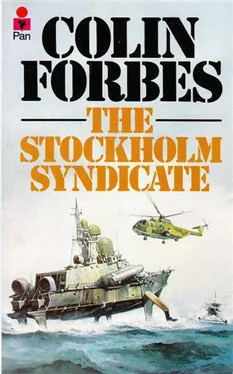Colin Forbes - The Stockholm syndicate
Здесь есть возможность читать онлайн «Colin Forbes - The Stockholm syndicate» весь текст электронной книги совершенно бесплатно (целиком полную версию без сокращений). В некоторых случаях можно слушать аудио, скачать через торрент в формате fb2 и присутствует краткое содержание. Жанр: Триллер, на английском языке. Описание произведения, (предисловие) а так же отзывы посетителей доступны на портале библиотеки ЛибКат.
- Название:The Stockholm syndicate
- Автор:
- Жанр:
- Год:неизвестен
- ISBN:нет данных
- Рейтинг книги:5 / 5. Голосов: 1
-
Избранное:Добавить в избранное
- Отзывы:
-
Ваша оценка:
- 100
- 1
- 2
- 3
- 4
- 5
The Stockholm syndicate: краткое содержание, описание и аннотация
Предлагаем к чтению аннотацию, описание, краткое содержание или предисловие (зависит от того, что написал сам автор книги «The Stockholm syndicate»). Если вы не нашли необходимую информацию о книге — напишите в комментариях, мы постараемся отыскать её.
The Stockholm syndicate — читать онлайн бесплатно полную книгу (весь текст) целиком
Ниже представлен текст книги, разбитый по страницам. Система сохранения места последней прочитанной страницы, позволяет с удобством читать онлайн бесплатно книгу «The Stockholm syndicate», без необходимости каждый раз заново искать на чём Вы остановились. Поставьте закладку, и сможете в любой момент перейти на страницу, на которой закончили чтение.
Интервал:
Закладка:
She didn't reply and hurried ashore. Behind her she heard the hatch cover close, sealing off entry into the cabin, the bolt snap home. Barfred was doing exactly what he said he would.
And in another way he had obeyed orders precisely. He had waited below deck for the car to arrive — so that just as the Darras' on their barge had never seen Dr. Otto Berlin in Bruges, so Barfred had no idea of the appearance of Dr. Benny Horn.
Sonia Karnell settled into the BMW and switched on the ignition, anxious to get away as soon as possible. Beside her Horn looked back at the fishing vessel, doubtless to make sure Barfred did not appear until after they had gone.
"We will just make sure that Beaurain's man from Stockholm is dealt with and then you can drive me back to Nyhavn. We will pick up a few things and fly straight to Stockholm."
"Lindahl? He is coming here?"
"Yes, my dear, he is coming to Elsinore and hopes to arrive here shortly. He is fleeing Sweden by fast car as though all the hounds of hell were behind him. What he doesn't know is that they are in front of him."
The huge motor ferry hardly moved in the gentle swell of the Oresund as it lay moored to the Swedish shore at Halsingborg. A steady stream of cars bound for Elsinore drove up the ramp and vanished inside Delfin II 's open maw.
Aboard, the passengers were already taking up position on the upper deck which gave them a good view of Denmark only a short distance miles across the sea channel. Through a pair of high-powered glasses a Swedish tourist gazed at Kronborg Castle which rose up on the far shore, and children clung to the ship's rail.
It was difficult to imagine a more peaceful scene, an atmosphere more removed from violence. Dancing across the sparkling crests of the blue, sunlit waves were innumerable yachts, their coloured sails twinkling triangles flapping in the mid-channel breeze.
A grey Volvo disappeared inside the vast loading deck, and Beaurain's agent guided his vehicle to the position indicated by the ferry loader. Switching off the ignition, Lindahl sank back in his seat and automatically reached for a cigarette until he saw the No Smoking notice staring straight at him.
He didn't really mind. For the first time in days he could relax. Within minutes he would have left Sweden. In less than an hour he would be talking to Jules Beaurain in Elsinore.
Lindahl climbed out of his car, locked it carefully, made sure all the windows were closed, and then began to climb the staircases leading to the higher decks. Yes, thank God, it would soon all be over — once the deadly information he carried inside his memory was transmitted to Beaurain. He would be safe again.
Underneath the keel of the motor-ferry Delfin II Karl Woltz and his team of three frogmen worked swiftly and skilfully. They had left the large steam-launch, rocking at anchor a few hundred yards away from the ferry, ten minutes earlier. As Woltz had impressed on his three subordinates, Timing is vital, the crossing is short and the action must occur shortly before landfall."
"Why then?" one man had asked.
"I don't know and I don't care!" Woltz had snarled impatiently. "All I know is we are being paid a small fortune."
Prior to slipping over the side of the steam-launch they had, as instructed, waited while Delfin II arrived from Elsinore, disgorged its human and wheeled cargo from Denmark, and started to take on board the cars and passengers waiting at Halsingborg. Woltz himself had watched through field glasses, seeing only the driver of the blue Mercedes who, in his turn, was watching the cavalcade of vehicles crawling up the ramp inside Delfin II.
Woltz had no idea who this man was or what he was looking for. Nor would he recognise him again. The man standing by the Mercedes wore a light trench coat with the collar turned up and a soft hat pulled well down over his face. Then he gave the signal. Using a tightly-rolled newspaper like a baton, he rapped the bonnet of the car five times in an absent-minded manner. Woltz counted the rises and falls of the newspaper, then dropped his glasses, turning to the others waiting in the launch.
"We go! For God's sake handle the equipment carefully."
Woltz had no way of knowing — nor would he have been interested — that the driver of the Mercedes had only given the go-ahead signal once he had seen Peter Lindahl drive his grey Volvo up the ramp and inside Delfin II.
"We want the entire ferry to sink within five minutes. There must be no survivors."
This chilling instruction had been given to Woltz inside an empty two-storey house outside the Swedish town of Malmo. The organisation of whoever he was dealing with had stimulated Woltz's sneaking admiration They had even gone to the trouble of fixing up a field telephone inside the house. As previously instructed, he had answered the instrument in a downstairs room, knowing that the man speaking was above him on the first floor. And nothing in the world would have tempted Woltz to creep up the staircase.
"Why not sink her in the middle of the Oresund? Why wait until she is close to the Danish shore?" Woltz had objected.
"That is not your problem. Just do as we tell you. You will be watched, of course. If you wish to get the balance of the money instead of a bullet in the back of the neck, start doing things our way."
It had been eerie — the voice, the atmosphere inside the abandoned house. Woltz had been relieved to get out of the place. Now, hidden under the ferry's keel, watching his team through the perspex window of his face-mask, Woltz had no occasion to feel anything but professional satisfaction at a job well done.
Six explosive limpet mines were attached to various parts of Delfin's hull. "Do not forget that three of the mines must be attached under the car deck," the voice in the house near Malmo had told him. Underneath the blurry silhouette of Delfin's hull, Woltz was trying to concentrate on what he was doing rather than on the consequences of his act which would be swift and horrendous.
The limpet mines had magnetic clamps — so attaching them to the hull was a simple job. You held the mine in the correct position, pressed the switch and the magnetic feet sprang up and affixed themselves like suckers. The last thing was to wait until all six mines were attached like obscene metallic boils and then Woltz himself swam along beneath the hull, pausing at each mine to press another switch which activated the radio mechanism.
As soon as the last man was safely back aboard the steam launch Woltz ordered a crewman to send the signal — the signal confirming that the mines were in position, that the radio mechanisms had been activated, that it now only needed whoever was holding the control device to press a button and detonate all six mines.
The signal was a dipping of the Danish flag at the stern. Borrowing a pair of field glasses, Woltz focused them on the blue Saab which had appeared and was parked where the Mercedes had stationed itself earlier. To his disappointment, the driver behind the wheel wore a helmet and goggles.
Woltz had no way of knowing that he was looking in the wrong direction — that the Saab was simply being used to divert his attention from a very powerful white motor-cruiser behind him. This vessel was proceeding south away from the car ferry — drifting with the tide at such a slow speed it was barely moving. On the bridge a bearded man wearing a nautical cap lowered the field glasses he had trained on Woltz's launch.
"That is the signal," he said.
"Now we know Lindahl is aboard — and that the Delfin is a floating bomb," replied Dr. Benny Horn, who stood beside the captain.
Delfin II was two-thirds of the way across the Oresund. Three more ferries were on the move; two crossing to Sweden, the third approaching the ferry terminal outside the railway station at Elsinore.
Читать дальшеИнтервал:
Закладка:
Похожие книги на «The Stockholm syndicate»
Представляем Вашему вниманию похожие книги на «The Stockholm syndicate» списком для выбора. Мы отобрали схожую по названию и смыслу литературу в надежде предоставить читателям больше вариантов отыскать новые, интересные, ещё непрочитанные произведения.
Обсуждение, отзывы о книге «The Stockholm syndicate» и просто собственные мнения читателей. Оставьте ваши комментарии, напишите, что Вы думаете о произведении, его смысле или главных героях. Укажите что конкретно понравилось, а что нет, и почему Вы так считаете.











